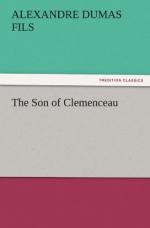“You talk of plunging into the strife; you are ready to endure privations, you would study and toil till you vanquish. Nonsense; you had far better repose, recruit after the humdrum, exhaustive life of college; enjoy life a little. Hear a love-song, not a professor’s lecture—see a dance of the ballet, not the procession of the deans and proctors; come to me for I am immediate sensation—the pleasure for all times—eternal intoxication—certain oblivion—the ideal bliss of the Hindoo! I am the grandest proof of Life—I am Love embodied!”
What did she sing to the strains of the voluptuous-waltz made vocal? The words mattered not; in Esquimaux they would have been as intelligible from the intonation with which she imbued every note, and the restricted but perfectly comprehensible gestures with which she emphasized the phrases of double meaning—one for the literary censors who had “passed” this corruption, the other for even the more obtuse of the common herd.
The rival whom, without having seen her, she had dethroned, was obliterated. It was not a transfer of allegiance—it was Semiramis; trampling an overthrown empress among the charred ruins of her palace, acclaimed without one dissentient shout, in her stead, and as the initial of a new line of sovereigns. She enchanted, interested and amused, while Rebecca had awed, ravished and strove apparently in vain to lift to a level where the elite alone soar without dread of a fall.
A witty cardinal has said that if a fly were seen in the drinking-cup by an Italian, a Frenchman and a German, respectively, the first would send it away, the second fish out the insect before he drank, while the German would gulp liquor and fly, without demur.
The good audience of Freyers’ Harmonista swallowed the so-called Fraulein von Vieradlers, flies and all! Claudius saw no more clearly than they; not only was the girl an unsurpassable idol, but to its very feet it was pure gold and immaculate ivory. An insane idea seized him not only to win her—a hundred around him shared that desire—but to keep her spotless, as he thought her, whatever the gossips had said. After all, slander had no opening to attack one whose youth was manifest; who owed no complexion to the wax-mask, the bismuth powder, and the carmine; whose hair was real and fine and of a shade which no dye could imitate; and whose movements, though in a society dance far removed from the wild whirl of the monads seen on this same stage, had the freedom of the bacchantes.
After all, the unworthiness of the object no more changes the quality of love than that of the glass alters the banquet of wine.
Oh, to withdraw her from this turbulent career, for which surely she was not inextricably destined, and let her be the bright but flawless ornament of a happy home and a choice circle—if not the lady of fashion, in case the student realized one of his fantastic dreams of aimless ambition. The quiet learner felt an immense flame usurp the place of his blood; he seemed gifted with the powers of the athletic Duke of Munich, Christopher the Leaper, whose statue adorned the proscenium, and like him, clearing the orchestra with a bound of twelve feet, he would have grasped the girl wasting her graces of voice and person on these boors, and carried her off to a more congenial sphere.




